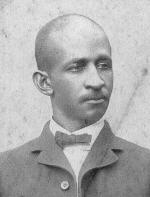| Birth: | Sep 1836 – New Orleans – Orleans Parish – Louisiana, USA |
| Death: | Sep 12, 1921 – Shreveport – Caddo Parish – Louisiana, USA |
|
Louisiana Reconstruction-era politician, soldier, businessman and early civil rights crusader, C.C. Antoine was born in New Orleans to free parents of color and was educated in private schools there. His family reasonably wealthy and his father a respected veteran of the War of 1812, Antoine enjoyed a relatively pleasurable youth in the nation’s most cosmopolitan and racially liberal antebellum city. When Louisiana seceded in 1861, Antoine and his brother, Felix, joined the 1st Louisiana Native Guards, a state militia unit formed of free men of color, but this was dissolved and never brought into the Confederate Army. After the Union captured New Orleans in early 1862, Antoine joined the Union army and attained the rank of captain, recruiting soldiers for Co. I, Seventh Louisiana negro regiment. However, he and other black officers were forced to relinquish their status as officers when Maj. Gen. Nathaniel Banks took command from Maj. Gen. Benjamin Butler. While most of the officers resigned, Antoine continued to serve through the end of the war as a common soldier. After the war, Antoine established a residence in Shreveport, where he got involved in business and politics. He also had a residence in New Orleans, where he was editor and publisher of the newspaper the “New Orleans Louisianian” from December 25, 1870, to April 27, 1872. He also was president of the Cosmopolitan Life Insurance Company and a partner with Reconstruction Era Lt. Gov. P.B.S. Pinchback as a cotton factor. He also served as a vice president of New Orleans’ Comite des Citoyens, formed in 1890 by black citizens to fight legal battles against discrimination. The committee challenged Louisiana’s 1890 Jim Crow Law, engaging a part-black New Orleanian, Homer Plessy, to test the public accommodations provisions of the law. This became the celebrated “Plessy Vs. Ferguson” case of 1896 that led to the Supreme Court of the United States upholding for the first time the doctrine of “separate but equal.” While far from perfect in terms of guaranteeing civil rights, the decision was nonetheless important in that it established in national law the recognition of equality in civil rights for people of all races, which was a necessary precondition for the successive civil rights laws that have followed. According to the obituary printed in Shreveport on his death, “during the reconstruction period, Antoine was one of the leading political powers in the state. He first entered Louisiana politics as a candidate for state senator, to which position he was elected. At the expiration of his term, in 1872, he was elected lieutenant governor, and after serving four years, was re-elected. For a period of several weeks, in 1876, he was acting governor, and issued a number of official orders.” Antoine was part of the Louisiana Constitutional Convention of 1870, in which he advanced Shreveport’s incorporation as a city. He owned extensive acreage in Caddo Parish, on which was later built the parish penal farm and the recent General Motors Assembly Plant. Antoine and his second wife, Maria, had a daughter and a son, but have no descendants bearing the Antoine name today. They are buried side-by-side in west Shreveport, but only his grave is marked with a federal stone sponsored by the local Sons of Confederate Veterans camp and former SCV National Commander in Chief Chuck McMichael. Spouse: Mariah Sylvania Ross Antoine (1841 – 1921) |
|
Red River Sankofa Historical Society
Go back to fetch it.

